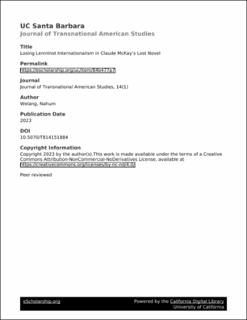| dc.contributor.author | Welang, Nahum | |
| dc.date.accessioned | 2023-11-01T10:51:45Z | |
| dc.date.available | 2023-11-01T10:51:45Z | |
| dc.date.created | 2023-05-29T18:29:24Z | |
| dc.date.issued | 2023 | |
| dc.identifier.citation | Welang, N. (2023) Losing LeninInst Internationalism in Claude McKay’s Lost Novel. Journal of Transnational American studies, 14 (1), 31-52. | en_US |
| dc.identifier.issn | 1940-0764 | |
| dc.identifier.uri | https://hdl.handle.net/11250/3099952 | |
| dc.description.abstract | Vladimir Lenin, leader of the Bolshevik movement, believed that a flourishing Black proletariat consciousness was the catalyst needed for a Communist revolution in the United States of America at the turn of the twentieth century. Thus, the Bolshevik egalitarian ideology of antiracism attracted Black Americans and anchored support for the global Communist agenda of Leninist Internationalism.
After Lenin’s death in 1924, his protégé Joseph Stalin becomes the new leader of Soviet Russia and signs and sustains a strategic arms alliance with Italy. In his Harlem-set lost novel Amiable with Big Teeth (AWBT), Jamaican-American writer Claude McKay chronicles how this decision places Stalin at odds with the Black American allies of Leninist Internationalism.
Fascist dictator Benito Mussolini invades Ethiopia in 1935 and because Stalin remains committed to the Italo-Soviet Pact, the Black American community in AWBT views this commitment as an endorsement of the colonial suppression of Ethiopia’s Black sovereignty and thus a violation of Lenin’s antiracism ideology.
With the demise of Leninist Internationalism in the Stalin era, AWBT argues that the Pan-Africanist agenda of Black-led organizations is more adept at forging antiracist and antiimperialist transnational bonds. However, Blackness is not a monolith and McKay’s lost novel must soon confront the uncomfortable reality that even within Black-led organizations, ethnic differences can easily supersede racial allegiance.
AWBT is ultimately a story about the arduous, and sometimes impossible, task of building an ideological identity across diverse national borders and racial groups. | en_US |
| dc.language.iso | eng | en_US |
| dc.publisher | UC Santa Barbara | en_US |
| dc.rights | Attribution-NonCommercial-NoDerivatives 4.0 Internasjonal | * |
| dc.rights.uri | http://creativecommons.org/licenses/by-nc-nd/4.0/deed.no | * |
| dc.subject | Lenin | en_US |
| dc.subject | Stalin | en_US |
| dc.subject | kommunismen | en_US |
| dc.subject | rasisme | en_US |
| dc.subject | Claude McKay | en_US |
| dc.subject | ideologi | en_US |
| dc.title | Losing LeninInst Internationalism in Claude McKay’s Lost Novel | en_US |
| dc.type | Peer reviewed | en_US |
| dc.type | Journal article | en_US |
| dc.description.version | publishedVersion | en_US |
| dc.rights.holder | © 2023 by the author(s) | en_US |
| dc.subject.nsi | VDP::Samfunnsvitenskap: 200 | en_US |
| dc.source.pagenumber | 31-52 | en_US |
| dc.source.volume | 14 | en_US |
| dc.source.journal | Journal of Transnational American studies | en_US |
| dc.source.issue | 1 | en_US |
| dc.identifier.doi | 10.5070/T814151884 | |
| dc.identifier.cristin | 2149958 | |
| cristin.ispublished | true | |
| cristin.fulltext | original | |
| cristin.qualitycode | 1 | |

